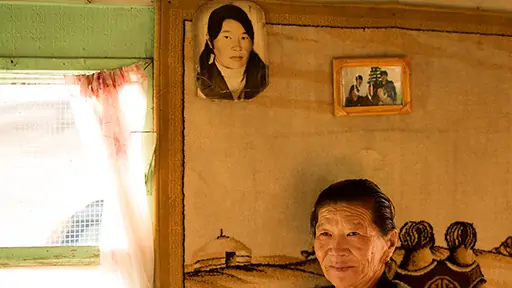Indigenous Calendar October, 2018: Life On Mars

This Mongol woman kindly agreed last year to be photographed beside a photo that was taken of her when she was much younger. She is now 65; the original photo was taken in the same year that Dark Side of the Moon was released. Back then (1973) we were still exploring the moon. And we were fascinated by the possibility that there might be life on Mars.
Most people witness changes in the world around them in the span of 45 years. This woman lives in one of the most undeveloped and inhospitable regions of the world — the Gobi Desert. Yet she too has seen changes in the time span between these two photos. For her, the changes have been transformative; they have resulted mainly from solar-powered electricity, satellite TV and cellular telephony.
Her ancient ancestors were likely also in the Gobi during the formative stages of the Mongol Empire — the first colonization of Asia. While travel through the area today is much easier than in the reign of Genghis Khan, it is still challenging. I traveled about a thousand kilometers there with one simple question in mind: how do people survive? I did not find a comprehensive answer to my question, but I soon realized that a sense of community is paramount. I found it almost impossible to believe that colonization by the khans was so successful.
After a few days of travel I came to another realization. When Mars had a thicker atmosphere than it does today, it must have been very similar to parts of today's Gobi.
We recently marked a few milestones in our exploration of space — the fortieth anniversary of the Voyager missions, landing successfully on an asteroid and the 100th launch of the Ariane rocket. We will soon attempt to colonize Mars. According to research published last year by Daniel Rothman we'd better do that soon. He predicts that at current levels we may pass the tipping point on the way to the next mass extinction by 2100. The selection criteria for the first Martian colonists will be stringent. They should instead be easy: send Gobi nomads. They will land, look outside the window and say "we're home, let's start colonizing."
If you enjoyed reading this article, please consider supporting independent, advertising-free journalism by buying us a coffee to help us cover the cost of hosting our web site. Please click on the link or scan the QR code. Thanks!


